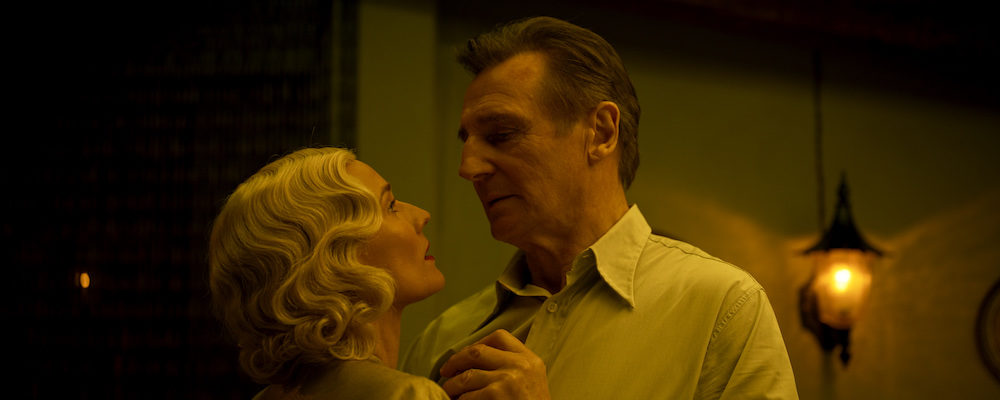‘Marlowe’ Sends Liam Neeson on a Hollywood Noir Case That Grows Too Cold
Alci Rengifo
With so many remakes and reboots flooding theaters and streamers, it’s actually quite a surprise to realize it’s been 44 years since someone made a movie using Philip Marlowe. Noir fans know the name from the books of the legendary Raymond Chandler. The character now returns in “Marlowe,” a movie that goes for old-school attitudes and visuals, with Liam Neeson getting into fights not involving traffickers, terrorists or hackers. It should all work with Neeson reuniting with director Neil Jordan. What they achieve best here is the visual allure of a Hollywood-set noir but not the clarity and essential unifying of all the threads at the end. Neeson has already been getting some annoyed notices for attempting to fill a role once inhabited by the likes of Humphrey Bogart and Robert Mitchum. But taken on his own he fills the role well. What’s missing is a better sense of plotting and environment.
The source material isn’t even an actual Chandler novel but “The Black-Eyed Blonde,” a 2014 entry authorized by the estate penned by Irish novelist John Banville. This explains why the narrative feels lacking when compared to what has come before. It all opens in 1939 as war in Europe looms and Philip Marlowe (Neeson) is a weary World War I veteran turned private eye operating in Hollywood. An attractive heiress named Clare Cavendish (Diane Kruger) steps into his office, cigarette in hand, and hires Marlowe to track down her missing lover, an industry nobody named Nico Peterson (François Arnaud). Despite Peterson seeming to have been killed outside of an elite club, Clare insists he’s alive. Marlowe begins his investigation which brings him across characters villainous and corrupt, like Clare’s icy mother, Dorothy (Jessica Lange).
With a roster of notables in the cast, “Marlowe” could be forgiven for its CGI L.A. landscapes (shooting took place in Dublin and Barcelona) if the case our detective embarks on were more engaging and easy to follow. The screenplay is surprisingly by William Monahan, who has written strong ensemble thrillers like “The Departed.” Jordan himself is also no stranger to intelligent, intense plotting with movies such as “The Crying Game” and “Michael Collins,” an underrated epic starring Neeson as the iconic Irish revolutionary. With “Marlowe” they are taken in by the idea of staging a noir in look while overthinking the mystery. From the get-go it’s rather muddled as Clare insists Nico is alive but we have no idea what makes him so important. A great actor like Danny Huston appears as club owner Floyd Hanson, delivering his lines with that smooth sophistication of his, which is enjoyable even if we don’t quite get what he’s talking about. Alan Cumming is a stylish and vicious gangster, flanked by his driver and shooter, Cedric, wonderfully played by Adewale Akinnuoye-Agbaje. The writing and editing falters in never being quite clear how all of these characters connect to the missing Nico, except through hazy references to drug running and a shadowy figure, “The Ambassador.”
It is often written about how ever since “Taken,” Neeson has been seen as more of an action star than dramatic actor. He’s appeared in some wonderful films recently but he has also defined a whole genre of above middle age actors taken down villains. “Marlowe” lets Neeson bask in the look of a ‘40s leading man with a few good one-liners. He’s not the younger, edgier detective of the Chandler novels, yet has his own charm as an experienced PI left cynical and sarcastic by a corrupt world. He and Kruger could have developed more chemistry but the plot fizzles out by the end. Jessica Lange steals the show anyway as Dorothy, who has the seductive tone of a real noir femme fatale, now turned into a venomous mom dismissive of everyone. It’s a seductive circle that never justifies its own intrigue. Motivations all around lack urgency or a plausible enough reason for everyone to be so obsessed with Nico. When the eventual climax arrives involving a burning studio lot, we’re still not clear on what was so important about anything needing to be covered up.
Chandler has been updated successfully before. Back in the ‘70s Robert Altman made “The Long Goodbye,” which has the edge and dashes of dark humor essential for a good noir. Neil Jordan here is obviously inspired by wanting to bring back an old school feel, throwing around references to everything from “The Maltese Falcon” to Leni Riefenstahl. Somehow the energy stays stubbornly subdued and the case, frankly, uninteresting. Stylishly-staged sequences involving a water tank and mermaid statue start off enticingly before descending into confusion. Who the culprit turns out to be is also quite predictable, despite their own role remaining muddled. “Marlowe” is left standing as a gallery of excellent actors who all efficiently deliver their lines. Liam Neeson looks great in a fedora and vest, walking around old Hollywood staring down suspects. It is the case as a movie that grows all too cold.
“Marlowe” releases Feb. 15 in theaters nationwide.

